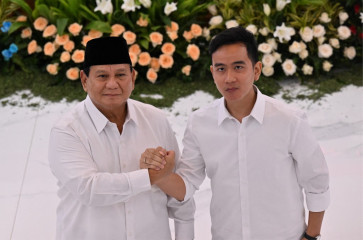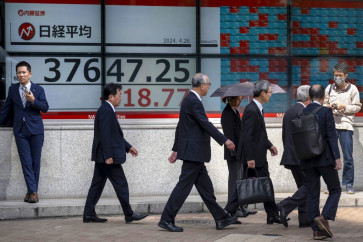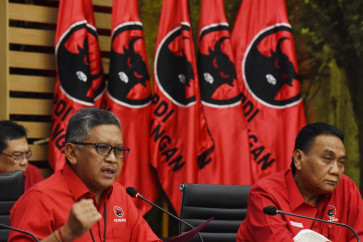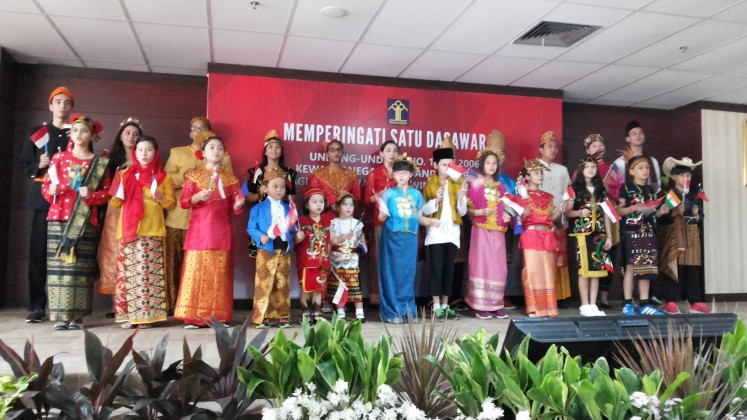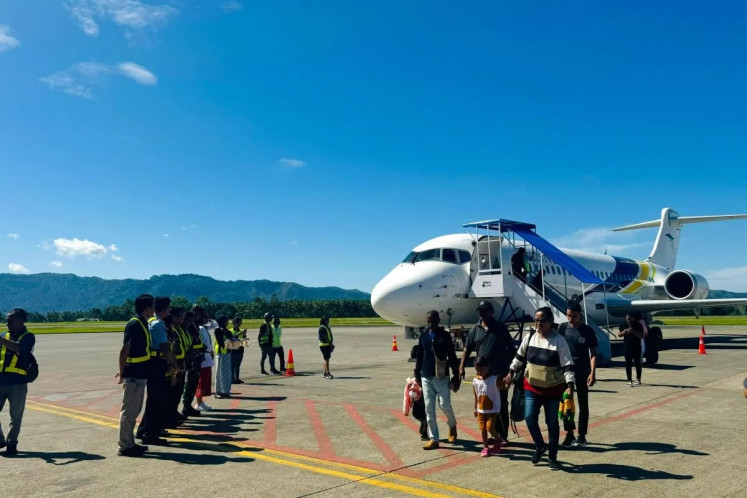Indonesian labor movement in disarray
Those sticks are for flags, right?: Three members of the Prosperous Labor Union Confederation of Indonesia (KSBSI) work on flags and banners for May Day celebrations (today)
Change Size

T
span class="inline inline-center">Those sticks are for flags, right?: Three members of the Prosperous Labor Union Confederation of Indonesia (KSBSI) work on flags and banners for May Day celebrations (today). The sticks could be used as weapons if the celebrations turn violent. Up to 50,000 workers and students were expected to take part in rallies centered around the Hotel Indonesia traffic circle, and march along Jl. Thamrin to besiege the Presidential Palace. JP/P.J. Leo
Following the violent rallies of the 2005 May Day, which saw several unionists jailed, celebration of International Labor Day has been quiet over the past four years. Will this year’s festivity be the same amid the employment crisis? The Jakarta Post’s Ridwan Max Sijabat looks into crucial labor issues.
As in previous years, celebration of this year’s International Labor Day is expected to be low on energy and too weak to provide momentum to improve workers’ welfare, as the labor movement has weakened over the last decade.
Most labor union activists are expected to stay at home for various reasons. Some have already organized dialogues with stake holders, including government officials and employers, to discuss major labor problems while others have planned industrial action and labor rallies to pressurize the government and the House of Representatives to address these conditions.
“The labor union leaderships are already in disarray. In this abnormal situation, it is better for us to play it safe rather than go to jail or die for no good reason,” chairman of the Confederation of Indonesian Prosperous Labor Union (KSBSI) Rekson Silaban said.
Many small labor unions, including the All-Indonesian Workers Organization (OPSI), Indonesian Metal Workers Union (SPMI) and the Labor Defenders Alliance (ABM) are skeptical they can field some 50,000 workers to besiege the Presidential Palace on Saturday in their protests against outsourcing policy and contract-based employment. They blame these policies for the worsening state of workers’ welfare over the past seven years.
They said that unlike in the past, on this year’s May Day, workers will rally along the Jl. Thamrin street from the Hotel Indonesia traffic circle to encircle the Presidential Palace. They will demand that President Susilo Bambang Yudhoyono step down for his ignorance of workers’ welfare.
“We want to warn the President and let him know that the labor movement is not yet dead,” OPSI secretary-general Timbul Siregar said, adding they wanted to tell unionists that they still stood by the workers.
Outsourcing, the contract-based employment system, the minimum wage system and social security system are four of the crucial labor issues which have contributed to poor labor conditions following the enactment of the Labor Law in 2003.
Unionists say that the weakening labor movement over the last decade has a lot to do with “the extra-marital relations” between labor unions and political parties.
“Many influential unionists like Muchtar Pakpahan, Dita Indah Sari and Budiman Sudjatmiko have established their own political parties, or joined existing political parties, while many others have entered their retirement age or passed away. Even worse, their parties did not get any seat in the legislative bodies. Once they became politicians, they did not return to the labor unions,” chairman of the Indonesian Confederation of Trade Union (ICTU) Thamrin Mossi said.
He said that of the many labor activists who had ventured into politics, only Budiman had won a seat in the House.
Chairman of the Confederation of All-Indonesian Workers Union (KSPSI) Mathias Tambing and chairman of the Indonesian Seafarers’ Union (KPI) Hanafi Rustandi said many outspoken unionists had lost their fighting spirit after they got facilities and preferential treatment from employers and the government.
“Certain unionists who led major industrial strikes and demonstrations during the New Order era, have become tame after getting positions as commissioners at state-owned enterprises and enjoying wealth, like houses and cars,” said Hanafi.
The weakening labor movement became obvious from a meeting of all trade unionists organized by the Frederich Ebert Stiftung in Sukabumi, West Java, last October, only three months after the presidential election.
During the three-day meeting, labor unions turned down two proposed options, namely either a merger between labor unions or the evolution of a common platform and programs.
The meeting turned into a sparring match between unionists who became suspicious of the agenda behind the proposals. They traded accusations that each of them had their own agenda.
Many unionists had accepted the meeting’s agenda after they failed to win a seat at the House of Representatives after the April 9 legislative election. But they still accused other unionists of conspiring with employers and government officials as allegedly evidenced by their rejection of strikes as a tactic to defend workers’ interests.
KSBSI has since been closely linked to the Labor Party led by labor unionist Muchtar. The party has failed to gain seats in the past two general elections.
Former manpower and transmigration minister Bomer Pasaribu questioned the legitimacy of more than 180 labor unions which he said were representing only 3.4 million out of 32 million workers employed in the formal sector.
“Only four labor unions have their real members in the field, several small unions have only a small number of members while many others have operated like nongovernmental organizations,” he said.
Bomer, also chairman of the Center for Labor and Development Studies (CLDS) said KSPSI, KSBSI, SPN, ICTU and SPMI were major unions supported by a total of more than 3 million workers.
“The weak labor movement and lack of solidarity among workers have to do with the great number of labor unions registered with the government with many having only pamphlets in their own office and a few members in the field,” he said.
Referring to the practices adopted in the United States, Japan and Australia, Bomer said the 180 labor unions should merge into three or four confederations to make them stronger socially and politically.
According to him, labor unions need support from political parties in fighting for pro-labor policies as long practiced in the industrialized countries.
“Major labor unions could have gentlemen’s agreements with certain major parties in fighting for their mutual interests,” he said, citing the political agreement between ICFTU (International Confederation of Free Trade Unions) and the Democratic Party in the US.
With such a gentlemen’s agreement, labor unions would support their partner parties in general elections and local polls. Besides, the partner parties would then make pro-labor policies, including laws and labor regulations. “Political parties should also appoint their liaison officers at the House of Representatives for negotiations with labor unions in responding to emerging issues,” said Bomer.
Many Soeharto-era unionists have become tame after they got positions as well-paid commissioners in state-owned enterprises.

